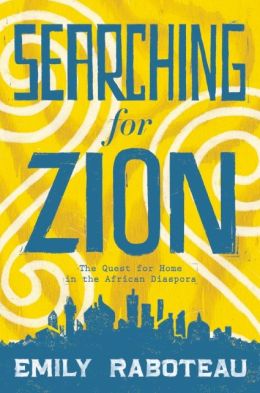Since I am a creative writing major my professors are also concentrated in that area. I have the opportunity to read their published work. For about a year into my graduate program reading my professors' publications never occurred to me before. Then I read one of my poetry professor's book of poetry this past winter break and now I am reading a professor's non-fiction novel.
As I swipe (on my kindle) through the pages of this book, I am disappointed in myself for being so judgemental when it comes to my professors. Emily Raboteau was a fiction workshop professor of mine last fall. Prior to taking her class I was enrolled in fiction workshops with other professors and expected their teaching style. It took me quite a long time to adjust to her way of teaching; not because it was unique or odd, just because I was used to something a bit different. Instead of adapting I grew quiet in her class and chose not to participate as much in order to avoid my discomfort. I judged. And I stewed in my judgement.
Her non-fiction book, Searching for Zion: The Quest for Home in the African Diaspora, is an amazing accomplishment. I am only half way through, so I cannot give a complete review, but Emily is quite brilliant. She shares personal, vulnerable feelings with the world in order to connect with readers and pull them into her story with unique details. I won't spoil it, so in general I'll just state that although she and I aren't and haven't been in too many similar circumstances, I still sense the importance of her cause and share the general sentiments that she writes of. Also, she travels quite a bit and to locations that I don't have the guts to visit. I admire her passion for the truth, for her devotion to herself and her courage throughout. She is inspirational, while maintaining a realistic view of the world. The use of language, simple and yet precise and strong structure has greatly impacted my own writing. By reading this book, I have gained more knowledge about religions and regions in the world that I had known little about prior. I am shamed that I didn't take advantage of her expertise while in her class. I wish I spent more time speaking with her about my own novel, her opinions and her own writings.
So the moral of the story? Don't judge a book by it's cover. So lame, I know. But in this case most definitely true. Teachers have lives outside the classrooms, their creativity extending further than my own talent, and in my naivety I presumed incorrectly. I ordered three other books written by professors in my program and hope to write reviews for each. I can never stop learning and I am grateful that my program and speciality allows me to simply order from a bookstore my professors' novel or book of poetry and have them guide me even when not in class.
Below is a link to Emily's website and to Amazon where you can order her book.
Emily's Website
Buy Her Book on Amazon

No comments:
Post a Comment